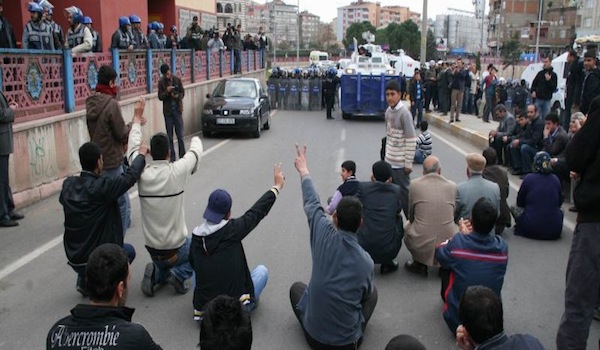 NORTH KURDISTAN, — The four demands of the Kurds consist of “a halt to all political and military operations”, “the release of political detainees”, “Reduction of the 10 percent election threshold”, and “the right to education in the mother-tongue”.
NORTH KURDISTAN, — The four demands of the Kurds consist of “a halt to all political and military operations”, “the release of political detainees”, “Reduction of the 10 percent election threshold”, and “the right to education in the mother-tongue”.
The demands have been expressed in the Civil Disobedience campaign and in the “Democratic Resolution Tents” for the past month. These actions have met with retaliation from the authorities including violent attacks and detentions.
Just as the operations have not ended, there have been additions to detentions. 15 people from the HPG (People’s Defence Force) have lost their lives. While 338 people are placed under detained, 149 have been arrested.
The Kurdish political movement has already taken many practical steps towards finding a democratic resolution to the Kurdish question and launched a new initiative called “civil disobedience” after the Newroz celebrations this year. The Kurds have established “democratic resolution tents” throughout the Kurdish regions and western provinces. Tens of thousands of people came together at the tents demanding “education in the mother tongue, a stop to political and military operations, release of political detainees including PKK leader Abdullah Ocalan, and lowering the 10% election threshold”.
However, the police violently intervened against the demands. The demands of “putting an end to political and military operations” and the “release of political detainees” have met with particular retaliation resulting in 15 HPG casualties, 338 detentions, 149 arrests as well as the maltreatment of two critically ill patients.
Harsh Clampdown on Activities at the Tents
The tents that have been erected in all quarters of Turkey faced violent assaults after Prime Minister Recep Tayyip Erdogan targeted them in a statement where he asked “what is civil about them” following the massive demonstration that took place in Diyarbakir, where the decision to launch the “civil disobedience” was activated. Dozens of people, including children, were arrested as the tents were raided by masked special teams in the early hours of the morning. One striking aspect of the intervention was the physical assaults on BDP MPs and Mayors.
Despite the intervention, two of the centres that demonstrated most of the resistance have been Kiziltepe and Nusaybin, where barricades remained erected for days. On the other hand, raising the level of their demands, Kurdish political leaders have initiated a process of “civil disobedience”. Therefore, the initiative that started with the tents as well as the determination to struggle has been raised to a higher level.
15 HPG members lost their lives as a result of military operations
Three members of the HPG, Halit Dag (Nurhak Ciya), Halime Bas (Sindar) and Ismail Husnu from Syria, lost their lives during operations in the countryside of Guclukonak of Sirnak on 14th March after the starting of the first Newroz fire in the neighbourhoods of Diyarbakir. Operations took place at Guclukonak before 8th March International Women’s Day, and one HPG member died during a skirmish in the district of Zewe.
Four HPG members lost their lives on 18th March at Ilbey Valley between Adakli and Kigi districts of Bingol after Newroz in Diyarbakir where more than a million people participated. Seven HPG members lost their lives during the operation of the Turkish armed forces at Hassa district of Hatay on 1st April while preparations to celebrate Kurdish national leader, Abdullah Ocalan’s birthday were underway.
Thirty-six HPG members lost their lives during the operations between 13th August when a ceasefire was announced upon the calls of intellectuals, artisans, and NGOs and 1st March. Military operations also took place in the countryside of Dersim, Hakkari, Mardin, Siirt, Sirnak and Diyarbakir.
Intense Military Deployment
As well as operations, an intense military deployment and activities took place about a week before Newroz. While military deployment continued in all the regional provinces all around Turkey, especially the Central Anatolia Region, special teams from Ankara have been stationed there as well. As part of the deployment, around a 100 military vehicles, long trucks carrying military equipment, have been directed to Hakkari through Van from the Central Anatolia Region. While these units were being stationed at the Hakkari border, activities started to construct mobile bridges on Hezil Stream that is on the border of Turkey and the Federal Kurdistan region. In Mardin, heavy weaponry and military equipment was requested for experienced village guards. After Newroz, military deployment took place in Sirnak, Hakkari borders and Dersim.